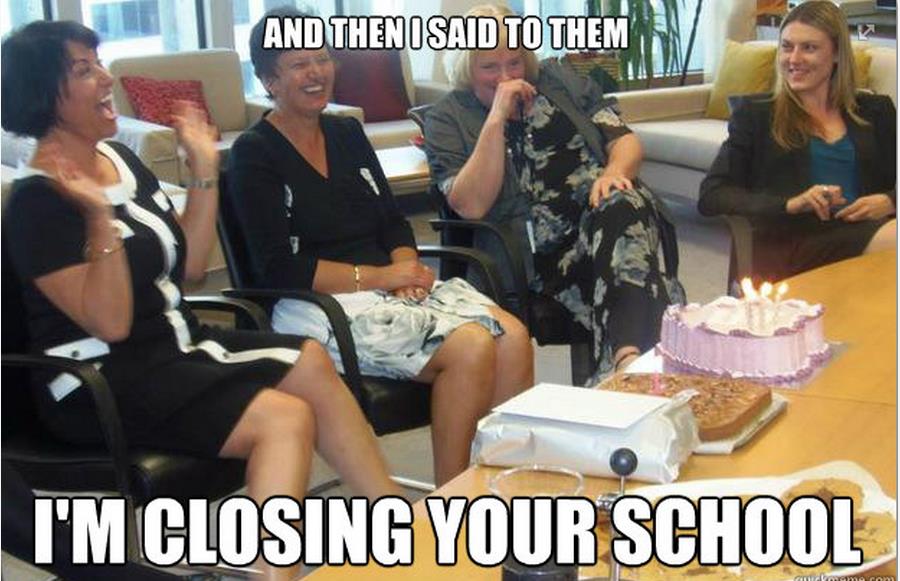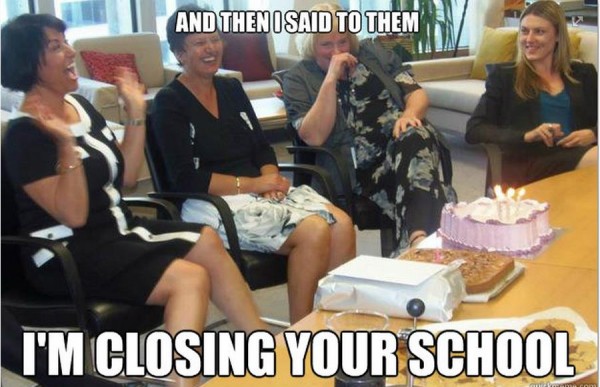The nature of government intervention in schools, either statutory or commissioner, perfectly fits Hekia Parata’s personality and the government’s philosophy. That personality and philosophy is expressed through the cruelties involved or perennially hovering; cruelties of Kafkan subtlety to breath-taking psychological brutality (though the latter is also to be found in Kafka); the lack of basic human rights; the manipulation of the judicial system (including using their insurance to drive principals into the ground); the use of the bureaucracies for manufacturing pro-ministry and anti-principal narratives (the media has a reflexive response of finding it hard to believe that the education bureaucracy lies – congenitally in this bureaucracy’s case); the structuring of how interventions are funded (turning the school against the principal through financial desperation and providing an incentive for managers and commissioners to elongate interventions); the personalities of some of the managers or commissioners involved (seemingly matched with schools for vindictive purpose); the process leading to two outcomes – the principal collapsing in a gibbering heap and resigning or making their day and standing by for ritual humiliation and disgrace; the trifling purposes for some interventions; the inefficiency of the length interventions; the way so many of the interventions become laden with personal vindictiveness; the way principals are treated falling well short of how a good employer should act (a lot of that in Part 2); the way interventions are part of the campaign against state schools and teachers, to advertise fault in them and to justify anti-state school policies; and the way interventions contribute to the environment of fear that pervades state school education making it malleable to government control.
I believe that if the policy of interventions had a personality it would be declared sociopathic. The policy is manipulative, cunning, callous, cronyistic, possessing a grandiose sense of its importance, lacking in empathy, and pathologically dishonest. No intervention, even ones that on the whole were considered to have gone well, are free from those negative characteristics because, no matter how they proceeded, they could not have gone uninfluenced by the pattern of casual cruelty that prevails – and in a democracy, ends are destructive to the means available, leading to principals facing reducing and tattered ways to vindicate themselves. (In this case, this reduction and tattering of the means to vindication may have enticed Hekia Parata to new heights of arrogance and, who knows, to her destruction.)
If the Rangiora High School scandal goes to the Employment Court, the ministry would lose hands down. The straightforward facts of the case would ensure that. The ministry, early on, in finding nothing of weight (as against what to its propaganda mills were turning) against the principal’s behaviour, recognised its vulnerability and has undertaken extraordinary manoeuvres to make things less straightforward, but to no substantial effect. From my point-of-view, as an education campaigner, bring it on; from the principal of Rangiora High School point-of-view, restoration and compensation might be the preference. But for me, that would reduce the likelihood of an Ombudsman inquiry and the exposure of Hekia Parata’s behaviour.
How did the ministry get itself into such a hole? Well it happens quite regularly, it’s just that on this occasion that hole has become more interestingly cavernous (to me), making it more of an effort to escape.
There is nothing in the behaviour or competence of the principal, or in the finances of the school, or school administration that justifies even a hint of a commissioner being required. In fact, other than the behaviour of a few board members who wanted land assets sold – and as the auditor general will confirm – illegally, the school was humming along. The school had the behaviour of the few board members well in hand with the school’s actions well relayed and approved. There were no reasonable grounds to believe there was a risk to the operation of the school to the welfare or educational performance of the school’s students (which is how the regulations are worded). Indeed, the school was in famous heart in all respects.
The Rangiora High School board of trustees was democratically elected in November 2014
and had nine board members with the requisite experience, skills and capacity to govern well. The community had full confidence in its new board and its experienced principal. And the appointment of this board had proceeded with the knowledge and approval of the ministry. As a way of demonstrating good faith and its confidence in the correctness of its policies, given the fuss about the refusal of the board to act illegally over a land sale, the board had asked the ministry for a Specialist Adviser Finance – that adviser was subsequently to give a fulsome report on the quality of the school’s financial systems and status (this was kept secret, though, while the deed was done against the board and principal.) What demands investigation here is the Specialist Adviser Finance being kept on in employment, even though the finances of the school were in commendable order. The motivation for this looks highly suspicious.
But it was at this this juncture something happened in Wellington and that juncture and that happening was to do with Hekia Parata. Before causing mayhem in a school, Hekia requires just a little opening in the situation (the teeniest, weeniest). And it came in the form of those disaffected board members referred to. They approached her wanting a re-interpretation of the caveat on land assets held under the Education Lands Act 1949 [High School Reserves] requiring that land only be sold for land – like-for-like as the expression went. The minister saw a re-interpretation as an opportunity for some of those land assets to be sold to help fund the school’s extensive rebuilding programme – but to do that she would have to get in a commissioner because the board would never agree.
I suggest, however, it was the opportunity to force another commissioner on a school – end of story – the satisfaction to be gained from that was the reason for the illegal takeover of Rangiora High School. The land issue the excuse; the imposition of a commissioner the reason.
My argument against Hekia Parata is not attacking the person; it is an honest attempt to expose the source of behaviour to illuminate the argument. Behaviour is indivisible from personality; to think otherwise is to inhabit Noddyland.
When John Key was in the final TV debate with Phil Goff, almost as an aside, but with ultimate sinister intent, he said state schools were going to get it. And I believe Hekia Parata became the perfect instrument for carrying out that threat. A summing up of the implications of government policy and statements on state schools would be that school principals and teachers are self-seeking, out-of-touch, unstable, incompetent liars who couldn’t fight their way out of a pedagogical paper bag even if provided with a slasher.
As a matter of legislative policy, intervention in schools has risen significantly amongst state schools; the ostensible reason ‘putting children first’ but the real reason to tarnish the reputation of state schools to justify school privatisation, to have state schools blamed for the fall in standards inevitable under the education policies implemented, to weaken the ability of state schools to lobby for policies and to oppose some of the government’s; and leaving aside the government’s ideological resentment of a state education being so effective, to reduce expenditure on education overall.
Hekia Parata is a past mistress of declaring her interventions and school closures as ‘putting the children first’, but coming from an individual rather empathy deficient (as against her fantastic snake-like charm when turned on for advantage) it comes across to me as nauseating. The implication, in saying that, for instance in her recent message about Redcliff, is that she cares where the parents and school don’t. When she says it about interventions, it carries the message that state school leaders are as children incapable of doing the right thing.
And so, now at Rangiora High School, Hekia went for it.
The school had asked for the Specialist Adviser Finance for the reasons discussed above but, out of the blue, a Specialist Adviser Employment/Human Resources was appointed.
Hekia had struck – another state school was to get it in the neck. Throw in some smears and let them fester, find some molehills and propaganda them to mountains, implement a nuanced range of psychological cruelties (to be detailed in horror and blood-splattered profusion in Part 2), let the 26 ministry media people loose, and sit back and enjoy the fun.
The school had asked for a Financial Adviser as a precaution, but who should turn up as well? a potential commissioner (much used as such elsewhere) titled Specialist Adviser Employment/Human resources, someone in a role the school had not asked for or needed. But Hekia back in her office was aching for the excitement of the hunt. The die was cast.
What follows in this posting and the one that follows is a minister puffed with arrogance and become careless because of it.
The Specialist Adviser Employment/Human resources then wrote a report that was sent first to the ministry rather than the board (what a legal clanger): that report lead to the dismissal of the board and the appointment of herself as commissioner.
Have you received the full weight of that? A person in an advisory role writing a report that leads to the dismissal of a lawfully appointed board, then using the same report that leads to herself gaining a powerful and lucrative position. This will be found unlawful both within State Service regulations and in natural justice. The person writing the report was acting unlawfully both in not following proper process and in the conflict of interest so obviously involved.
And when the report, much redacted, was given to the principal after the effect (in effect), what a nonsense it is (I speak as a former senior inspector of schools here much used to reports around principal behavioural matters), full of trifles adding up to nothing. Not sound and fury but a sparrow twitter and fart. Appointing commissioners has become such cheap traffic to Hekia that the seriousness of the process has obviously slipped her thought processes and moral compass (whatever setting that is on).
The principal received a heavily redacted copy of the report in mid-February accompanied by an order separating her from the board. So we have an adviser appointed to advise, then writing a report that is used by the ministry to divide the principal from the board. Then that report is used to dismiss a lawfully appointed board, but without the board being given the report. Finally that report being the basis for the writer of that report being given commissioner status. Bring on the Employment Court and the Ombudsmen.
Following are some questions; soon I hope to be answered before a judge, also a parliamentary inquiry.
- Why did the Rangiora High School board of trustees not receive EITHER of the Specialist Advisers’ Reports by the due date of 14 February 2015 as commissioned?
- Why did both Specialist Advisers’ Reports go directly to the ministry of education and NOT the Rangiora High School Board of Trustees, who had commissioned them?
- Why was the Rangiora High School board of trustees dismissed on the strength of the Specialist Adviser Employment/Human Resources report but never given a copy of the report to respond to?
- Once the Rangiora High School board of trustees was dissolved why did the ministry of education appoint the Specialist Adviser Employment/Human Resources to the position of commissioner?
- And on what reasonable grounds [Education Act 1989, section 78I (2)] did the Minister of Education intervene and dissolve the Rangiora High School Board?
- Why was there never a judicial review of the process used to dismiss the Rangiora High School Board of Trustees?
Then there was to be the strange case of the leak of papers to Michael Parkin of TV1 and the subsequent appointment of a private investigator, at the cost, purportedly, of tens of thousands of dollars, and who obviously came up with nothing. I don’t have any details of all this but I suppose the argument was that the principal was the only one with the motivation. In my view the principal had nothing to gain and everything to lose by such an action. I would like to suggest that the ministry, in realising the financial report had come up trumps in favour of the school and the employment report coming up with nothing, it was the ministry who had a motivation to leak to Michael Parkin to try to trip the principal up on a contingent technicality.
Here we have a principal honoured as a New Zealand finalist in Women of Influence; completing a doctorate in the education of Maori children; with a long record of unblemished successful principalship – being dealt to. It is a government coup d’etat against the established authority of a school, humiliating a principal in ruthless fashion in front of the pupils, teachers, local community, and the wider education community. And, there is worse to come – what is to follow is the gratuitous cruelties of the ministry of education fulfilling its obligations to act in good faith as a good employer. It was as if Rangiora had become a cuckoo’s nest and we have a woman, near alone for a good time, acting courageously for herself and all of us, to fly over it.
Kelvin Smythe is one of New Zealand’s foremost educators. He was a Senior Inspector of Schools, based at the Hamilton Education Board, until the neoliberal reorganisation of schooling in 1990, under the euphemistic label “Tomorrow’s Schools’, brought this to an end. Kelvin saw which way things were headed and chose to set out on a one man campaign to safeguard and promote all he held dear about New Zealand education, and to attack the neoliberal agenda. Twenty five years later his fears have been proved to be well founded and his battle continues unabated.







Good coverage on the advancement of this dictatorship as it takes a tight grip on our minds & those of the young as well as the and the media as they brainwash us all.
It seems we not only blam beneficiaries, Pacificas, druggies, poor statistics for poor economic management by government, but now, teachers are being blamed for stuff to.
Hope New Zealand can get over its self soon and vote responsibly at the next elections.
Oh and +100 for this piece Mr Smyth.
Now captcha math in error ,same nonsense as previously displayed by this system ,or you don’t want comments.
Hmmm…. there seem to have been a rash of Principal resignations recently. I wonder if this is why?
I will ask this question on here since it is about education:
Honours to those in Education
http://www.scoop.co.nz/stories/PA1512/S00442/ny-honours-recognise-service-to-education.htm)
Who is Janet Elspeth Adams ?
Is this the same person?
https://nz.linkedin.com/in/jan-adams-694b4869
Comments are closed.